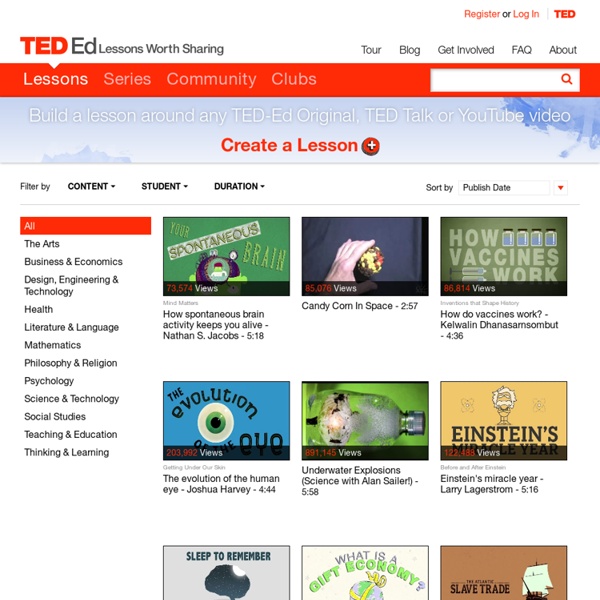



http://ed.ted.com/lessons?page=2
Related: General Sciencefree university lectures - computer science, mathematics, physics, chemistry Whether your goal is to earn a promotion, graduate at the top of your class, or just accelerate your life, lectures can help get you there. Our archives of lectures cover a huge range of topics and have all been handpicked and carefully designed by experienced instructors throughout the world who are dedicated to helping you take the next step toward meeting your career goals. Lifelong learns can turn their free time turn into self-improvement time. The online lectures on this list are more than lecture notes or a slideshow on a topic -- they were designed for audiences like you, with carefully sequenced themes and topics taught by veteran educators, and often with additional resources for your own independent study. The lectures are available to anybody, completely free of charge.
Hacking Habits: How To Make New Behaviors Last For Good In the workplace and in life, we are little more than the sum of our habits. Who we are and what we accomplish depends largely on a vast network of routines and behaviors that we carry out with little to no thought whatsoever. As neuroscientist David Eagleman writes in Incognito, “Brains are in the business of gathering information and steering behavior appropriately. It doesn’t matter whether consciousness is involved in the decision making. And most of the time, it’s not.”
111 Lessons Life Taught Us Sometimes thinking about your life and sorting out what you have learned is just as important as tackling a new venture. That’s what our new sister site, Everyday Life Lessons, is all about. It’s an online community where people share, rank and discuss life’s greatest lessons. 12 great free online courses Much ado has been made in recent years over the quickly rising cost of healthcare in the United States. But the cost of college tuition and fees has skyrocketed at nearly twice that rate. Going to college today will cost a student 559% more than it did in 1985, on average. In an exciting talk given at TEDGlobal 2012, Stanford professor Daphne Koller explains why she was inspired — alongside fellow professor Andrew Ng — to create Coursera, which brings great classes from top universities online for free. Coursera classes have specific start dates, require students to take quizzes and turn in assignments, as well as allowing professors to customize their course into online chunks rather than simply recording their lectures.
THE SOCIOLOGY OF KNOWLEDGE Before we go any further here, has it ever occurred to any of you that all this is simply one grand misunderstanding? Since you're not here to learn anything, but to be taught so you can pass these tests, knowledge has to be organized so it can be taught, and it has to be reduced to information so it can be organized do you follow that? In other words this leads you to assume that organization is an inherent property of the knowledge itself, and that disorder and chaos are simply irrelevant forces that threaten it from outside.
What's one of the WORST ways to motivate someone? Hint: You see it all the time. Like This Post On Facebook TRUE or FALSE: The best way to motivate a certain behavior in someone is simply to reward them for it. False. Well, kind of. Of course, it's not entirely that simple. The ideal motivation depends on what kind of task you're trying to get someone to accomplish. 10 Mind-Blowing Theories That Will Change Your Perception of the World Reality is not as obvious and simple as we like to think. Some of the things that we accept as true at face value are notoriously wrong. Scientists and philosophers have made every effort to change our common perceptions of it.
18 ways to educate yourself every day (because nerds are sexy) « ♥ Malavika ♥ “Anyone who stops learning is old, whether at 20 or 80. Anyone who keeps learning stays young. The greatest thing in life is to keep your mind young.” Henry Ford At the start of this year I made a decision that I want to commit to myself to a pursuit of intellect. Sciences A view of the Earth as seen by the Apollo 17 crew while traveling to the Moon on December 7, 1972. Africa, Madagascar, and the Arabian Peninsula are visible, and you can barely make out the Antarctic, shrouded in the heavy cloud cover in the southern hemisphere. Arching cloud patterns show the presence of weather fronts. Image courtesy of NASA/Apollo 17. Brilliant Harvard Psychologist Explains How To Achieve Long-Term Happiness In This Popular TED Talk Like This Post On Facebook Anytime you look at the news, it's about death, destruction, abductions, natural disasters... That kind of thing can mess us up. It makes the world look scarier than it is. It's like wearing [the opposite of rose-colored glasses].